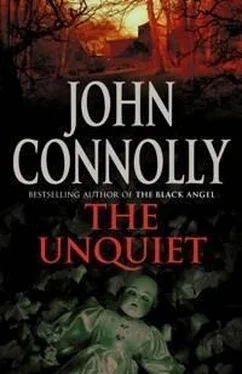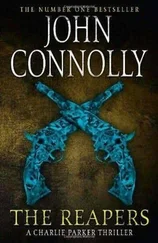“Well, it’s his call. Don’t say I didn’t offer.”
The door closed for a moment, and I could hear the rattling as the security chain was removed. When it opened again, I got my first proper look at Dubus. He was hunched by age and illness, and by his years in prison, but there was still a vestige of the big, strong man that he had once been. His clothes were clean and carefully ironed. He wore dark trousers, a blue-striped shirt, and a tightly knotted pink tie. He was wearing an old-fashioned eau de cologne that bore hints of sandalwood and incense. The interior of the house gave the lie to any first impressions evoked by the exterior. The floorboards shone, and it smelled of furniture polish and air freshener. There were paperback books on a small shelf in the hallway, on top of which stood an old-fashioned rotary dial telephone. Nailed to the wall above it was a copy of the “Desiderata,” a kind of twelve-step program for those afflicted by the trials of modern life. The rest of the walls were decorated with prints of paintings in cheap frames-some modern, some much older, and most unfamiliar to me-although the images had clearly been carefully chosen.
I followed Dubus into his living room. Again, everything was clean, even though the furniture had come from thrift stores and was scuffed and worn. A small TV sat on a pine table, tuned to a comedy show. There were more prints on the walls here, as well as a couple of originals, each depicting a landscape. One of them seemed familiar. I walked over to take a closer look at it. From a distance, it appeared to be a painting of a forest, a line of green trees against a red sunset, but then I saw that one of the trees stood taller than the rest and had a cross at its highest point. Daniel Clay’s signature was visible in the bottom right-hand corner. It was Gilead.
“He gave it to me,” said Dubus. He was standing at the opposite side of the room, keeping a distance between us. It was probably a result of his time in jail, when you learned to give every man his space, even in such a confined area, or you faced the consequences.
“Why?”
“For talking to him about Gilead. You mind if we sit down? I get tired. I have to take this medication.” He gestured at some bottles of pills on the mantel above the fireplace, where three logs were hissing and sparking. “It makes me drowsy.”
I sat down on the couch across from him.
“If you want coffee, I can make some,” he said.
“I’m fine, thank you.”
“Okay.” He tapped his fingers on the arm of the chair, his eyes flicking toward the TV. It appeared that I had disturbed his evening’s viewing. Then, apparently resigning himself to the fact that he wasn’t going to be left to watch it in peace, he hit a button on the remote, and the picture died.
“So what do you want to know?” he asked. “I get people through here now and again: students, doctors. You can’t ask me anything I ain’t already been asked a hundred times before.”
“I’d like to know what you discussed with Daniel Clay.”
“I talked about Gilead,” he said. “That’s all I ever talk about. They used to test me, show me pictures and stuff, but they don’t do that no more. I guess they think they know all that they need to know about me.”
“And do they?”
His Adam’s apple bobbed. I could hear the sound that it made deep in his throat. He regarded me for a time, then seemed to come to some decision.
“No, they don’t,” he said. “They got as much as they’re going to get. Don’t think you’re going to get anything more than they did.”
“What was Clay’s interest in Gilead?” I asked. I didn’t want to alienate Dubus. He might have been drowsy and medicated, but he was still sharp.
“He wanted to know about what happened. I told him. I didn’t leave nothing out. I don’t have nothing to hide. I’m not ashamed of what we did together. It was all”-he screwed up his face in distaste-“misunderstood, misinterpreted. They made it out to be something it wasn’t.”
“What we did together,” as though it was a mutual decision reached between the adults and the children, as natural as fishing, or picking berries in summer.
“Children died, Mr. Dubus.”
He nodded. “That was bad. That shouldn’t have happened. They was babies, though, and times were hard up there. Might almost have been a blessing, what happened to them.”
“As I understand it, one was stabbed to death with a knitting needle. That’s a peculiar definition of a ‘blessing.’”
“You judging me, sir?” He squinted at me, the trembling of his hands giving the impression that he was struggling, yet failing, to control great anger.
“It’s not for me to do.”
“That’s right. That was why I got on with Dr. Clay. He didn’t judge me.”
“Did Daniel Clay ever talk about the children in his care?”
“No.” Something unpleasant animated his features for an instant. “I tried, though. He didn’t bite.” Dubus snickered.
“How many times did he come here?”
“Two or three, far as I can remember. He visited me in jail, too, but that was just once.”
“And it was all very businesslike. He interviewed you, and you talked.”
“That’s right.”
“And yet he gave you one of his paintings. I hear he was very careful about those to whom he gave his paintings. Very selective.”
Dubus shifted in his chair. That Adam’s apple began bobbing again, and I was reminded of Andy Kellog worrying at his loose tooth. Both were indicators of stress.
“Maybe I was helpful to him. Maybe he didn’t view me as no monster. I could see it in your friend’s face out there, and I could see it in yours when I opened the door. You tried to hide it with politeness and good manners, but I knew what you were thinking. And then you came in here, and you saw the pictures on my wall, and how clean and neat everything was. I wasn’t wallowing in my own filth. I wasn’t stinking, or dressed in filthy, tattered clothes. You think I want the outside of my place to look the way it does? You don’t think I want to paint it, to fix it up some? Well, I can’t. I do what I can around here, but there ain’t nobody going to help a man like me to keep his house in order. I paid for what they said I done, paid with years of my life, and they’re going to make me keep paying until I die, but I won’t give them the satisfaction of being ground down. You want monsters, you look elsewhere.”
“Was Daniel Clay a monster?”
The question seemed to shock him into silence, then, for a second time, I saw the intelligence at work behind the withered façade, that creeping, nasty, corrupted thing that had allowed him to do what he had done and to justify it to himself. I thought it might even have been what the children of Gilead had glimpsed as he moved upon them, his hand clasped across their mouths to stifle their cries.
“You got your suspicions of him, like the rest,” said Dubus. “You want me to tell you if they’re true, because if we shared something like that, if we both had the same tastes, then maybe I’d have known, or he’d have opened himself up to me. Well, if you think that, you’re a fool, Mr. Parker. You’re a fool, and someday you’ll die for your foolishness. I got no time to talk to foolish men. Why don’t you head off now? Drive on up the road there, because I know where you’re going. Could be you’ll find the answer in Gilead. That’s where Daniel Clay found the answer to his questions. Oh yes, he found what he was looking for up there, but he didn’t come back from that place. You best step carefully, or else you won’t come back neither. It gets inside your soul, old Gilead.”
He was smiling broadly now, the keeper of the truth of Gilead.
Читать дальше












